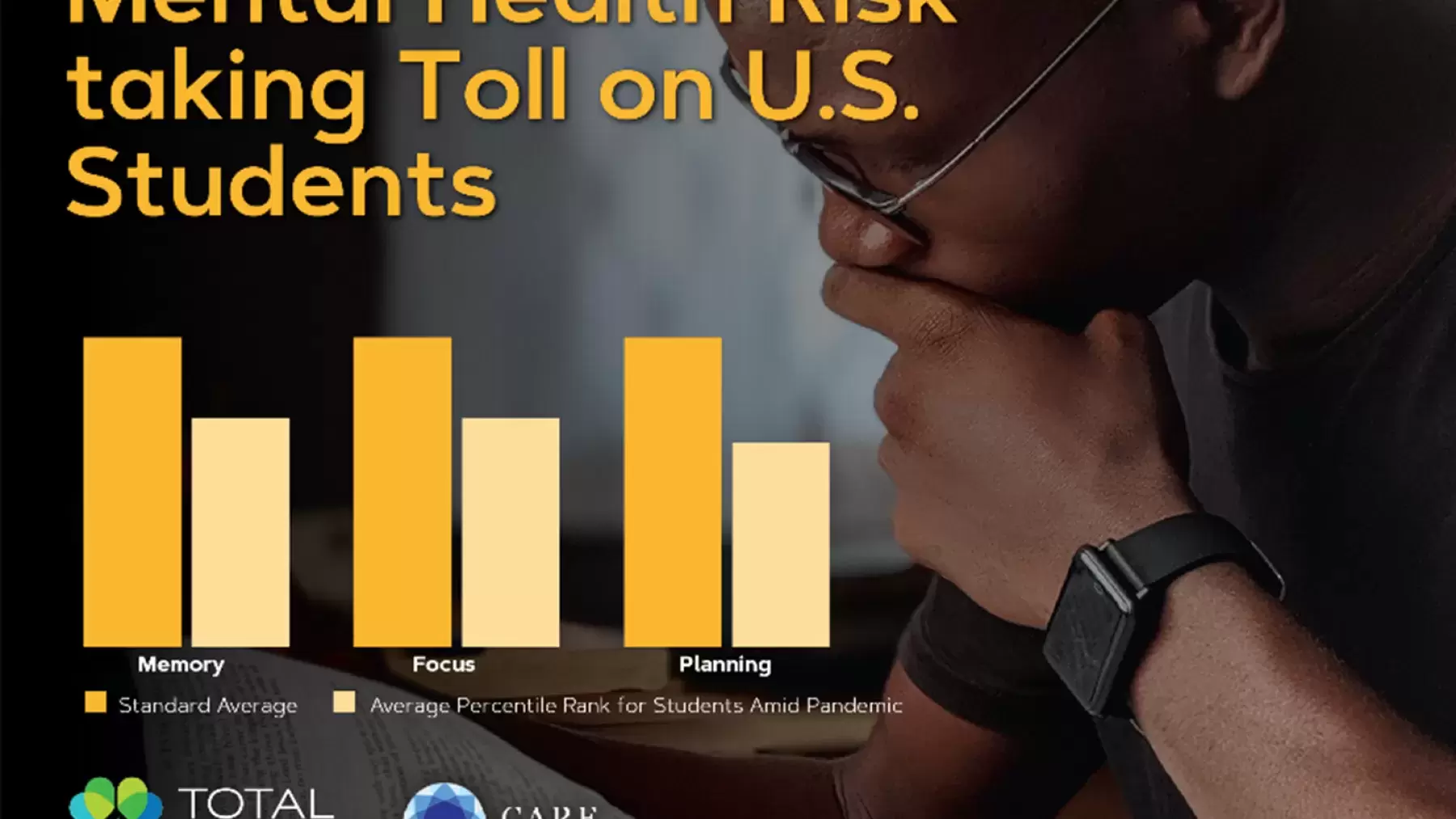
By Louis Gagnon, CEO of Total Brain
One year into COVID-19, school systems nationwide report that grades are taking a hit. Poor adaptation to virtual learning mandates and economic inequities have been cited as key drivers of the toll on academics. However, neuroscience suggests that the unprecedented decline in student mental health is an equally strong indicator of academic performance. Success in school is inextricably linked to brain capacities, such as memory, focus, and planning. Those brain functions are themselves directly affected by mental health.
Repeated and prolonged stress and anxiety hijacks the brain and puts us in fight-or-flight mode. When we perceive danger, all of our bodily systems are focused on keeping us safe. Naturally, chronic stress and anxiety inhibits the ability to learn by making us inflexible vs. flexible and contracting vs. expansive.
Teens and young adults have been particularly vulnerable to the mental health impacts of the pandemic. An American Psychology Association study found seven out of ten students, ages 8to 23, reported experiencing common symptoms of depression.
Recently, Total Brain and the Center for Adolescent Research and Education (CARE) partnered on a neuroscientific study. We looked at the impact of declining mental health on student cognitive capacities during the time of COVID-19. We went into this national study with knowledge that the pandemic was taking a tremendous toll on the mental health of adolescents and young adults. We wanted to see to what degree this unprecedented emotional strain was impacting students’ ability to learn.
Our findings are consistent with research that points to an epidemic of mental health concerns among today’s youth. When we assessed more than 1,000 high school and college students, ages 13 – 22, nearly half were at risk for general anxiety (48%) and social anxiety (45%). And two in five students were at risk for PTSD (39%) and depression (40%).
Further, when we measured student cognitive capacities - memory, focus, and planning - we discovered that the average percentile rank for students in each of these functions fell well below the standard average. Expressed in percentile ranking, the standard average for any capacity is the 50th percentile ranking. What we found was:
- Memory: 37th percentile rank (13 percentile points below standard average)
- Focus: 37th percentile rank (13 percentile points below standard average)
- Planning: 34th percentile rank (16 percentile points below standard average)
In response to our research findings, Barry A. Garst, Ph.D., Associate Professor, Youth Leadership Development at Clemson University noted, “The importance of providing students with resources that strengthen their resilience and flexibility in the face of conflict or change has never been more apparent than now.”
Stephen Wallace, president and director of our research partner CARE says, “Students can benefit greatly from lessons designed to build self-awareness, build on cognitive strengths and address deficit areas in need of development.”
The psychological impact of having an entire population of students under extended periods of stress cannot be underestimated. A high risk for common mental health conditions can severely impact student motivation and engagement, academic performance, and ultimately graduation rates. An entire generation is at risk of never reaching their full potential – and that should worry us all.
As our nation awaits the tsunami of mental health issues born from or worsened by COVID-19, investments in student mental health may be among the wisest ways our nation can support today’s youth. Teaching students strategies and coping skills to deal with stress and anxiety and providing tools and vocabulary to communicate their feelings is a very smart move. The long-term economic benefits of a standardized mental health curriculum will yield an incalculable return for students, businesses, the economy, and society-at-large. Learning to manage mental health is as important as learning the ABCs, multiplication tables, or basic biology.
 Louis Gagnon is the CEO of Total Brain, a mental health and wellness platform powered by the world’s largest standardized neuroscientific database. He is Advisor to TPG Capital, a top-tier US private equity firm who named him CEO of Ride, a portfolio company that he restructured. As a corporate executive, Louis held dual Chief Product Officer and Chief Marketing Officer roles at Audible/Amazon, Yodle and Monster Worldwide. As an entrepreneur, Louis created and led five business and social enterprises on four continents, many of which were in the field of reproductive health. He received a Bachelor of Business Administration from Laval University in Quebec City and a Master of Science in Marketing from HEC-Montreal. His work has been featured in a number of management books and magazines including The Economist.
Louis Gagnon is the CEO of Total Brain, a mental health and wellness platform powered by the world’s largest standardized neuroscientific database. He is Advisor to TPG Capital, a top-tier US private equity firm who named him CEO of Ride, a portfolio company that he restructured. As a corporate executive, Louis held dual Chief Product Officer and Chief Marketing Officer roles at Audible/Amazon, Yodle and Monster Worldwide. As an entrepreneur, Louis created and led five business and social enterprises on four continents, many of which were in the field of reproductive health. He received a Bachelor of Business Administration from Laval University in Quebec City and a Master of Science in Marketing from HEC-Montreal. His work has been featured in a number of management books and magazines including The Economist.




